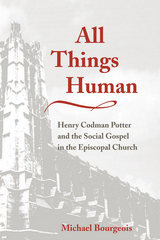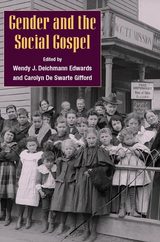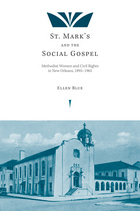
In addition to being the sixth bishop of the Diocese of New York, Henry Codman Potter (1835-1908) was a prominent voice in the Social Gospel movement of the late nineteenth and early twentieth centuries. This book, the first in-depth study of Potter's life and work, examines his career in the Episcopal church as well as the origins and legacy of his progressive social views.
As industrialization and urbanization spread in the nineteenth century, the Social Gospel movement sought to apply Christian teachings to effect improvements in the lives of the less fortunate. Potter was firmly in this tradition, concerning himself especially with issues of race, the place of women in society, questions of labor and capital, and what he called "political righteousness." Placing Potter against the wider backdrop of nineteenth-century American Protestantism, Bourgeois explores the experiences and influences that led him to espouse these socially conscious beliefs, to work for social reform, and to write such works as Sermons of the City (1881) and The Citizen in His Relation to the Industrial Situation (1902).
In telling Potter's remarkable story, All Things Human stands as a valuable contribution to intellectual and religious history as well as an exploration of the ways in which religion and society interact.

A practical theological response to the stark realities of poverty and injustice prevalent in turn-of-the-century America, the social gospel movement sought to apply the teachings of Jesus and the message of Christian salvation to society by striving to improve the lives of the impoverished and the disenfranchised. The contributors to this volume set out to broaden our understanding of this radical movement by examining the lives of some of its passionate and vibrant female participants and the ways in which their involvement expanded and enriched the scope of its activity.
In addition to examining the lives of individual women, the essays in Gender and the Social Gospel contain broader analyses of the gender and racial issues that have caused the histories of movements such as the social gospel to be viewed almost exclusively in terms of their male, European-American, intellectual participants at the expense of the women, African Americans, and Canadians whose contributions were just as worthy of attention.


The impact of St. Mark’s Community Center and United Methodist Church on the city of New Orleans is immense. Their stories are dramatic reflections of the times. But these stories are more than mere reflections because St. Mark’s changed the picture, leading the way into different understandings of what urban diversity could and should mean. This book looks at the contributions of St. Mark’s, in particular the important role played by women (especially deaconesses) as the church confronted social issues through the rise of the social gospel movement and into the modern civil rights era.
Ellen Blue uses St. Mark’s as a microcosm to tell a larger, overlooked story about women in the Methodist Church and the sources of reform. One of the few volumes on women’s history within the church, this book challenges the dominant narrative of the social gospel movement and its past.
St. Mark’s and the Social Gospel begins by examining the period between 1895 and World War I, chronicling the center’s development from its early beginnings as a settlement house that served immigrants and documenting the early social gospel activities of Methodist women in New Orleans. Part II explores the efforts of subsequent generations of women to further gender and racial equality between the 1920s and 1960. Major topics addressed in this section include an examination of the deaconesses’ training in Christian Socialist economic theory and the church’s response to the Brown decision. The third part focuses on the church’s direct involvement in the school desegregation crisis of 1960 , including an account of the pastor who broke the white boycott of a desegregated elementary school by taking his daughter back to class there. Part IV offers a brief look at the history of St. Mark’s since 1965.
Shedding new light on an often neglected subject, St. Mark’s and the Social Gospel will be welcomed by scholars of religious history, local history, social history, and women’s studies.

Gladden was one of the first among clergymen to respond to the intellectual and social currents that arose to challenge traditional modes of Protestant thought and social action. By the end of the nineteenth century, when both liberal theology and the Social Gospel had, in a sense, triumphed as the dominant forces in American Protestantism, he had achieved recognition as one of the earliest, most constant, and most influential exponents of both movements. He was, in addition, one of their chief popularizers; and his copious writings—some forty books and hundreds of articles—represent classic examples of the liberal, socially-conscious Protestantism that distinguished his age.
Mr. Dorn has provided the first comprehensive study of Gladden’s spectacular career. He traces his life and its influences from his birth in Pennsylvania to his long and successful pastorate at the First Congregational Church in Columbus, Ohio, where he gained national fame in stormy encounters with such prominent figures as the redoubtable Billy Sunday and his wife “Ma,” and for his lucid and vigorous positions on national issues such as the “tainted money” controversy that brought him into conflict with Standard Oil.
READERS
Browse our collection.
PUBLISHERS
See BiblioVault's publisher services.
STUDENT SERVICES
Files for college accessibility offices.
UChicago Accessibility Resources
home | accessibility | search | about | contact us
BiblioVault ® 2001 - 2024
The University of Chicago Press









